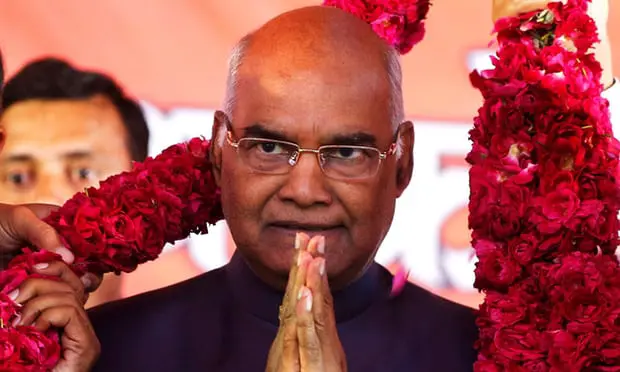A member of India’s poorest and most oppressed caste is expected to be elected president.
Ram Nath Kovind, the governor of Bihar until last month, was announced as the nominee of Narendra Modi’s government in June, in what was widely seen as part of a decades-long strategy by Hindu nationalists to win over members of the dalit (Untouchable) community.
Nearly 5,000 Indian state and federal members of parliament took part in a secret nationwide ballot on Monday to decide the next president using specially designed violet ink pens with unique serial numbers.
The five-year post has significant responsibility under India’s constitution, but similar to other Westminster-style governments, it is largely ceremonial in practice.
The result of the collective parliamentary votes will not be known until Thursday, but Kovind, 71, has secured wide cross-party support and is expected to comfortably beat Meira Kumar, the former diplomat and MP nominated by the opposition Congress party and its allies.
Kovind and Kumar are dalits, highlighting the community’s symbolic and electoral significance.
Dalits, officially known as scheduled castes, were traditionally thought to fall outside the four castes that determined the shape of Hindu lives, from jobs and diets to marriage prospects.
As a result, they were considered “impure” and banished to the periphery of Indian society, suffering thousands of years of exclusion and extreme poverty that affirmative action programmes in the past 70 years have done little to address.
In historical examples popularised by the dalit leader BR Ambedkar, members of the caste in one village were forced to wear spittoons around their necks to collect their impure saliva, while in another, they had to tie branches to their waists “so as not to leave any unclean footprints”.
Badri Raina, a Delhi University professor for four decades, said winning dalit support had become essential to the vision of Hindu unity promoted by Modi’s Bharatiya Janata party.
The BJP argues that India’s culture and institutions are inherently Hindu in nature, a premise that dalits have traditionally eyed with suspicion, seeing in the party’s platform the priorities of the same upper-caste Hindus who oppressed them.
Propelled by canny politics and Modi’s charisma, the BJP has recently made inroads into segments of the dalit community, but faces significant hurdles, especially when it comes to the key party priority of cow protection.
“Dalit livelihoods have been predominantly dependent on the cattle industry, both for nutrition and the leather market, yet there, the BJP has made no concessions,” Raina said.
In Gujarat last year, seven young dalit men who skinned a dead cow, an “unclean” role traditionally carried out by members of the caste, were filmed being publicly flogged by self-styled cow vigilantes, triggering significant protests.
Meat industry regulations introduced in May banning the market sale of cows and other livestock for slaughter are also thought to have hit dalits hardest, along with Muslims, another of India’s poorest social groups.
In May, an advance team for the BJP chief minister of Uttar Pradesh, Yogi Adityanath, reportedly gave dalit villagers soap and asked them to clean themselves before an official visit.
If elected, Kovind would be the second dalit president after KR Narayan, who held the post for five years from 1997.
(THE GUARDIAN)
 简体中文
简体中文

